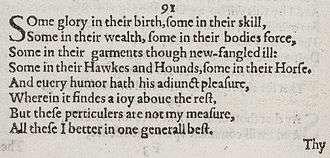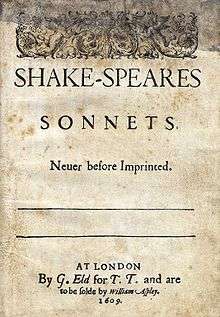Sonnet 91
Sonnet 91 is one of 154 sonnets written by the English playwright and poet William Shakespeare. It's a member of the Fair Youth sequence, in which the poet expresses his love towards a young man.
| Sonnet 91 | |||||||
|---|---|---|---|---|---|---|---|
 The first two stanzas of Sonnet 91 in the 1609 Quarto | |||||||
| |||||||
Paraphrase
Some people delight in their noble ancestry; some in their abilities; some in their wealth or strength; some in their hunting animals. But I don't take joy in any of these things because I have something even better: To me your love is better than noble ancestry, wealth, expensive clothes or hunting animals. And as long as I have you, I feel prouder than anyone else. But I am also cursed in only a single thing: that if you stop loving me, I will become the most wretched person.
Structure
Sonnet 91 is an English or Shakespearean sonnet. The English sonnet has three quatrains, followed by a final rhyming couplet. It follows the typical rhyme scheme of the form, ABAB CDCD EFEF GG, and is composed in iambic pentameter, a type of poetic metre based on five pairs of metrically weak/strong syllabic positions. The 11th line exemplifies a regular iambic pentameter:
× / × / × / × / × / Of more delight than hawks and horses be; (91.11)
- / = ictus, a metrically strong syllabic position. × = nonictus.
The sonnet abounds with metrical variants. Lines 5 and 7 have a final extrametrical syllable or feminine ending. Line 2 exhibits both an initial and a mid-line reversal, two of at least nine such reversals in the poem.
/ × × / / × × / × / Some in their wealth, some in their bodies' force, (91.2)
Both lines 8 and 9 may be scanned to exhibit the rightward movement of the third ictus (resulting in a four-position figure, × × / /, sometimes referred to as a minor ionic):
× / × / × × / / × / All these I better in one general best. × / × / × × / / × / Thy love is better than high birth to me, (91.8-9)
Interpretations
- Peter Barkworth, for the 2002 compilation album, When Love Speaks (EMI Classics)
Notes
- Pooler, C[harles] Knox, ed. (1918). The Works of Shakespeare: Sonnets. The Arden Shakespeare [1st series]. London: Methuen & Company. OCLC 4770201.
References
- First edition and facsimile
- Shakespeare, William (1609). Shake-speares Sonnets: Never Before Imprinted. London: Thomas Thorpe.CS1 maint: ref=harv (link)
- Lee, Sidney, ed. (1905). Shakespeares Sonnets: Being a reproduction in facsimile of the first edition. Oxford: Clarendon Press. OCLC 458829162.
- Variorum editions
- Alden, Raymond Macdonald, ed. (1916). The Sonnets of Shakespeare. Boston: Houghton Mifflin Company. OCLC 234756.
- Rollins, Hyder Edward, ed. (1944). A New Variorum Edition of Shakespeare: The Sonnets [2 Volumes]. Philadelphia: J. B. Lippincott & Co. OCLC 6028485.
- Modern critical editions
- Atkins, Carl D., ed. (2007). Shakespeare's Sonnets: With Three Hundred Years of Commentary. Madison: Fairleigh Dickinson University Press. ISBN 978-0-8386-4163-7. OCLC 86090499.
- Booth, Stephen, ed. (2000) [1st ed. 1977]. Shakespeare's Sonnets (Rev. ed.). New Haven: Yale Nota Bene. ISBN 0-300-01959-9. OCLC 2968040.
- Burrow, Colin, ed. (2002). The Complete Sonnets and Poems. The Oxford Shakespeare. Oxford: Oxford University Press. ISBN 978-0192819338. OCLC 48532938.
- Duncan-Jones, Katherine, ed. (2010) [1st ed. 1997]. Shakespeare's Sonnets. The Arden Shakespeare, Third Series (Rev. ed.). London: Bloomsbury. ISBN 978-1-4080-1797-5. OCLC 755065951.
- Evans, G. Blakemore, ed. (1996). The Sonnets. The New Cambridge Shakespeare. Cambridge: Cambridge University Press. ISBN 978-0521294034. OCLC 32272082.
- Kerrigan, John, ed. (1995) [1st ed. 1986]. The Sonnets ; and, A Lover's Complaint. New Penguin Shakespeare (Rev. ed.). Penguin Books. ISBN 0-14-070732-8. OCLC 15018446.
- Mowat, Barbara A.; Werstine, Paul, eds. (2006). Shakespeare's Sonnets & Poems. Folger Shakespeare Library. New York: Washington Square Press. ISBN 978-0743273282. OCLC 64594469.
- Orgel, Stephen, ed. (2001). The Sonnets. The Pelican Shakespeare (Rev. ed.). New York: Penguin Books. ISBN 978-0140714531. OCLC 46683809.
- Vendler, Helen, ed. (1997). The Art of Shakespeare's Sonnets. Cambridge, MA: The Belknap Press of Harvard University Press. ISBN 0-674-63712-7. OCLC 36806589.
.png)
